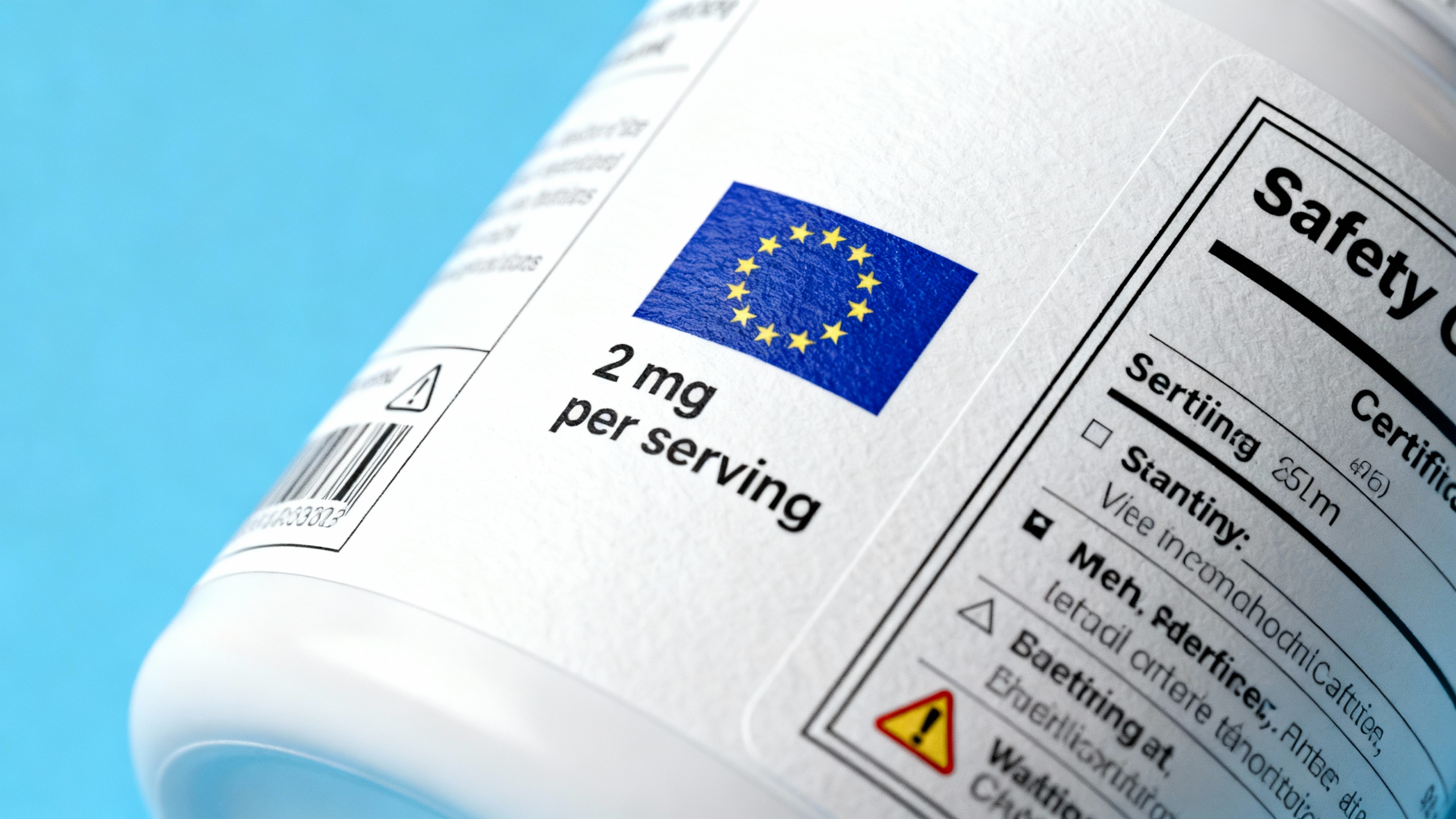Introduction
The European Food Safety Authority (EFSA) has proposed a conservative acceptable daily intake (ADI) of 2 mg of CBD per day as of September 2025, citing unresolved toxicological concerns and significant data gaps in human safety evidence. This move will reshape compliance, labeling, and enforcement across the EU’s fragmented CBD market. Stakeholders—from raw material suppliers and brands to retailers and compliance officers—must prepare for swift regulatory shifts in light of this new scientific opinion.
This detailed update explores the new EFSA CBD 2 mg ADI 2025 benchmark, its likely impact on Novel Food dossiers, national enforcement, product withdrawals, interim retail practices, and advertising substantiation. We also contrast the EU framework with the evolving stance of the UK Food Standards Agency (FSA), providing clarity for dual-market brands.
EFSA’s 2 mg CBD ADI—Background and Scientific Rationale
In September 2025, EFSA released its updated safety assessment on cannabidiol, concluding that a daily intake of more than 2 mg CBD per person could not currently be considered safe for the general population (EFSA summary, NutraIngredients coverage). The draft specifies this value as a provisional safe dose (approx. 0.0275 mg/kg for a 70 kg adult), subject to further public and industry consultation through October 2025.
Key Drivers:
- Persistent gaps in toxicology and evidence of potential liver safety risks.
- High variability in human CBD bioavailability, influenced by the matrix and food intake.
- Findings of systemic accumulation and placental transfer, heightening caution for sensitive groups (e.g., children, pregnant women).
While EFSA continues data collection, this 2 mg/day figure will underpin both future Novel Food authorizations and national risk management strategies.
Implications for EU Novel Food Applications and Existing Dossiers
Stricter Evidentiary Expectations
EFSA’s updated guidance signals that pending and new Novel Food dossiers for CBD products must demonstrate:
- Full-spectrum impurity profiling (testing for unknown cannabinoids, solvents, and contaminants).
- Robust product stability and shelf-life data.
- Comprehensive human toxicology evidence addressing liver function, drug interactions, and special populations.
Applicants with serving sizes or recommended daily dosages exceeding 2 mg will likely face additional scrutiny or rejection in the authorization process.
Stakeholders with dossiers already under EFSA or EC review should anticipate formal requests to align application data, labels, and risk management documentation with the new 2 mg ADI. This may require supplementary studies, active dossier management, and rapid communication with authorities.
Member-State Enforcement: The ‘Cascade’ Effect
Once EFSA finalizes its ADI recommendation, Member State authorities (Ministries of Health, food safety agencies) are expected to:
- Require immediate relabeling of products with serving sizes or instructions exceeding 2 mg/day.
- Demand withdrawal or suspension of non-compliant products from shelves and online stores.
- Initiate targeted market surveillance and sampling initiatives to verify compliance.
- Update import/export controls and border checks.
According to recent industry analysis, the pace and severity of enforcement will vary, but some states (e.g., Italy, Germany) may act within weeks of EFSA finalization, while others lag due to administrative backlogs.
Retailer and E-Commerce Policy
Major retailers and e-commerce platforms are already preparing for rapid policy updates. This includes:
- Pausing listings of ingestible CBD that exceed 2 mg/day.
- Requiring up-to-date certificates of analysis and compliance documentation.
- Flagging high-dose or ambiguous products for delisting or recall.
Labeling and Advertising: Substantiation and New Consumer Warnings
EU Novel Food compliance standards mandate that labels and marketing materials:
- Clearly specify maximum daily intake (now 2 mg/day recommended).
- Include prominent warnings against use by individuals under 25, pregnant or breastfeeding, or those taking medication (per EFSA risk statement).
- Prohibit any health claims unsupported by authorized studies.
Updated advertising substantiation rules will further restrict promotional messages. Expect more frequent legal challenges and complaints against brands exaggerating benefits or softening EFSA warnings on-pack and online.
For the latest policy language and templates for compliant product literature, reference: EFSA FAQs and EU regulatory guidance.
Impact for Dual-Market Brands: EU vs. GB (UK) CBD Rules
EU: 2 mg ADI
- Labels and PMFs (product master files) must reflect the 2 mg daily dose.
- Stringent requirements for impurity testing, batch stability, and human safety substantiation.
GB (UK): 10 mg Provisional ADI
The UK Food Standards Agency (FSA) continues recommending a provisional 10 mg CBD/day ADI for healthy adults as of September 2025 (FSA board minutes).
- FSA guidance does not mandate warnings for children, pregnancy or medication to the same extent as EFSA.
- Dual-market brands must develop separate GB- and EU-compliant labels, serving sizes, and risk warnings.
- In some cases, identical products may need different batch release testing or stability documentation.
- Consult the FSA official site for current public consultations and enforcement updates.
Implications for Brands and Compliance Teams
- Maintain segregated SKU inventories for EU/EAA and GB distribution.
- Monitor ongoing Novel Food consultation timelines in both EU and UK for further changes.
- Re-train sales teams and update supply chain documents for region-specific compliance.
Key Takeaways and Next Steps for Industry Stakeholders
- The new EFSA 2 mg/day ADI for CBD will likely drive product reformulation, urgent label updates, and possible removals of higher-dose products from the EU market.
- Brands must revisit Novel Food dossiers to demonstrate full compliance with EFSA’s updated toxicology, impurity, and stability evidence standards.
- National authorities and marketplace platforms in the EU are preparing for active enforcement—businesses should anticipate rapid audits and penalties for non-compliance.
- Dual-market brands need clearly differentiated, country-specific product information and operational procedures for GB and EU sales.
- Early, transparent communication with regulators and partners is crucial. Monitor EFSA’s guidance page and official compliance news at CannabisRegulations.ai for authoritative updates.
This article is for informational purposes only and does not constitute legal advice. For the latest compliance strategies and automated monitoring tools, visit CannabisRegulations.ai and stay ahead of European regulatory change.
